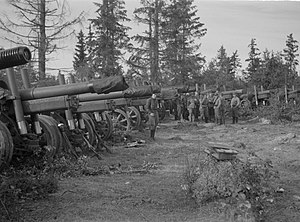Battle of Porlammi
| Battle of Porlampi | |||||||
|---|---|---|---|---|---|---|---|
| Part of Continuation War | |||||||
 Soviet howitzers of the 101st howitzer artillery regiment captured at Porlampi. |
|||||||
|
|||||||
| Belligerents | |||||||
|
|
|
||||||
| Commanders and leaders | |||||||
| Karl Lennart Oesch | Vladimir Kirpichnikov (general) | ||||||
| Units involved | |||||||
| IV Corp | 23rd Army | ||||||
| Strength | |||||||
| 43,000 | 35,000 | ||||||
| Casualties and losses | |||||||
| 700 casualties, 2700 wounded | 7000 casualties, 1000 wounded, 9000 prisoners | ||||||
The Battle of Porlampi, also known as the Battle of Porlammi, was a military engagement fought between the Finnish Army and Red Army from 30 August to 1 September 1941 on the Karelian Isthmus. The battle was fought near the town of Porlampi during the second month of the Continuation War. The battle was a Finish victory and effectivly ended the reconquest of Karelia.
Territorial disputes between the Soviet Union and Finland caused the outbreak of the Winter War in November 1939. Several months of fighting ensued, during which the Red Army was able to push back the Finnish defenders on the Karelian Isthmus. Located on the main road to the vital port of Vyborg, the town of Porlampi was occupied by the Soviets in March 1940 following the Battle of Summa.
Following the end of the Winter War in March 1940, Finland was forced to cede the parts of Karelia to the Soviet Union, with Porlampi being one of the territories given over.
On 22 June 1941 the German Wehrmacht launched Operation Barbarossa, the planned invasion of the Soviet Union. Prior to commencement of Barbarossa, Finnish and German officers had planned for possible Finnish participation in the war against the Soviet Union. Finland mobilized 16 infantry divisions, one cavalry brigade, and two jäger brigades of the Finnish Army to the newly established border with the Soviets on 21 June, and on 22 June conducted Operation Kilpapurjehdus, an action that violated the Moscow Peace Treaty. That same day, German naval bombers began mining the waters around Leningrad, with some of the aircraft being deployed from airfields in Finland. On 25 June a flight of Soviet bombers struck at airfields in Finland, and Soviet artillery stationed in Hanko fired on Finnish targets.
...
Wikipedia
